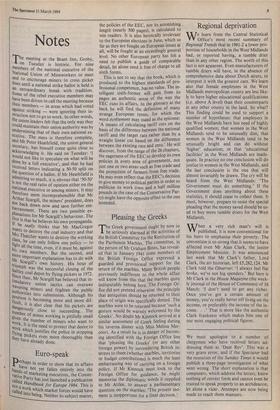Regional deprivation
We learn from the Central Statistical Office's most recent summary of Regional Trends that in 1981-2 a lower pro- portion of households in the West Midlands had, or reported having, a tumble drier than in any other region. The worth of this fact is not apparent. Even manufacturers of tumble driers will have, in the absence of comprehensive data about Dutch airers, to interpret it with the greatest care. We learn also that female employees in the West Midlands metropolitan county are less like- ly to have higher educational qualifications (i.e. above A level) than their counterparts in any other county in the land. So what? This finding could be used to support a number of hypotheses: that employers in the West Midlands have less need of highly qualified women; that women in the West Midlands tend to be unusually dim; that women in the West Midlands tend to be unusually bright and can do without 'higher' education; or that 'educational facilities' in the West Midlands are inade- quate. In practice no one conclusion will do justice to women in the West Midlands, and the last conclusion is the one that will almost invariably be drawn. The cry will be heard from the West Midlands: 'The Government must do something.' If the Government does anything about these statistics, it should cease to collect them. It must, however, prepare to resist the special pleading that the money saved should be us- ed to buy more tumble driers for the West Midlands.
When a very rich man's will is published, it is now conventional for his heirs to emphasise their poverty. The convention is so strong that it seems to have affected even Mr Alan Clark, the junior Employment Minister. It was announced last week that Mr Clark's father, Lord Clark, the art historian, left £5,282,124. Mr Clark told the Observer: 'I always feel flat broke, we're not big spenders.' But here is Mr Clark in the House Magazine (the week- ly journal of the House of Commons) of 16 March: 'I don't need to get any richer. Once you've got a certain amount of money, you're really better off living on the income, or preferably the income of the in-
come. . That is more like the authentic Clark frankness which makes him one of our most engaging political figures.














































 Previous page
Previous page